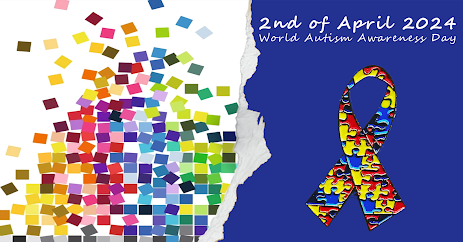World Autism Awareness Day is an International Day celebrated Every Year on April 2nd
It's a special day aimed at raising awareness of autism, a developmental disorder that affects communication and social interaction. The goal is to educate people about autism and to promote acceptance and inclusion for individuals on the autism spectrum.
Autism, also known as Autism Spectrum Disorder (ASD), is a complex neurological developmental disorder that affects communication, social interaction, and behavior. It manifests differently in every individual with symptoms ranging from mild to severe. Some common signs of autism are difficulties in social interaction, repetitive behaviors, and communication difficulties. Autism is a growing concern worldwide and affects about 2 to 5% of all children – but not only children. It is often diagnosed for the first time in adulthood. It is a lifelong condition for which there is currently no cure. However, one could also wonder if a 'cure' is necessary, rather than good mutual understanding and interaction. Early diagnosis and intervention can certainly significantly improve the life of people with autism and their families, and environment.
On World Autism Awareness Day, organizations and individuals worldwide join together to raise awareness and promote acceptance, including organizing events such as walks, fundraisers, and educational seminars. Many organizations take the opportunity to share inspiring stories of people with autism and their families and provide information about available resources and services.
Despite considerable progress ...
in understanding autism, there is still much that researchers do not know about the disorder. This includes the underlying causes, effective treatments, and possible cures. Therefore, continued research is essential to helping people with autism lead healthier and more fulfilling lives.
One area of research that appears promising is genetics. Studies have suggested that there may be a genetic component to autism, with certain genes associated with an increased risk for developing the disorder. By identifying these genes and understanding how they contribute to autism, researchers may be able to develop new treatments or even prevent the disorder from happening in the first place.
Another promising area of research is early intervention. Studies have shown that early diagnosis and intervention can significantly improve outcomes for children with autism. This includes specialized support services like speech therapy or occupational therapy at a young age to help children learn essential skills like communication and social interaction.
However, ...
there is still much that researchers do not understand about autism. For example, it is unclear why some people with autism also suffer from other conditions such as anxiety or depression. In addition, there are currently no medications specifically available for treating autism symptoms. To close these knowledge gaps, continued research into the causes and treatments of autism is essential. This includes funding for basic science research and clinical trials for potential treatments. With increased knowledge and understanding of the disorder, we can work towards better outcomes for people on the autism spectrum and their families.
People with autism are at an increased risk of developing mental health conditions such as anxiety and depression. This could be due to challenges in social interaction and communication, as well as difficulties processing sensory input. In addition, coping with the demands of everyday life can be overwhelming for people with autism.
It's important for people with autism and their families to be aware of the possible impacts on mental health and seek appropriate support if needed. This can include care or 'accompaniment,' therapy, or medication management to cope with symptoms of anxiety or depression.
There are also strategies that people with autism can use to manage their mental health. These include:
- Sensory regulation - People with autism can find certain sensory stimuli overwhelming or distressing. Learning strategies to regulate sensory input, such as using noise-cancelling headphones or taking breaks in a quiet room, can help reduce stress and anxiety.
- Mindfulness techniques - Practicing mindfulness techniques such as deep breathing or meditation can help people with autism cope with feelings of anxiety or overwhelm.
- Social support - Building a strong support network can also help manage the mental health of people with autism. This can include family members, friends, or support groups specifically for people on the autism spectrum.
In summary, it can be said that...
World Autism Awareness Day is an important day to raise awareness about autism and promote acceptance and inclusion for people with autism. It's an opportunity to educate people about autism and promote early diagnosis and intervention.
By working together on acceptance and inclusion, we can create a more inclusive and supportive society for people with autism and their families.






I welcome your feedback, thoughts, and suggestions with open arms. I make it a point to read every comment and respond when feasible, although I do not make comments public.
ReplyDelete